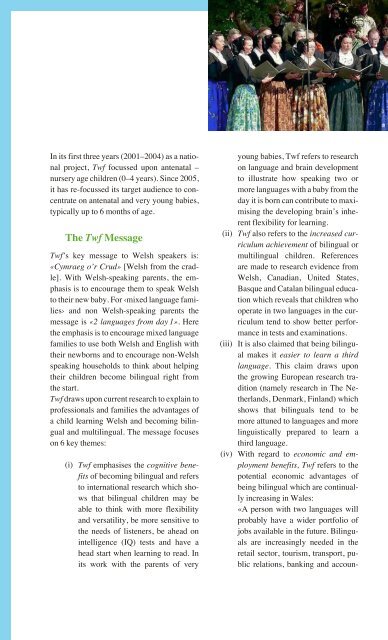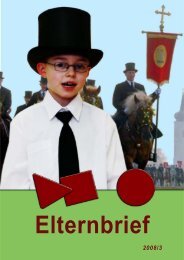Witaj und 2plus - Sorbischer Schulverein e.V.
Witaj und 2plus - Sorbischer Schulverein e.V.
Witaj und 2plus - Sorbischer Schulverein e.V.
Sie wollen auch ein ePaper? Erhöhen Sie die Reichweite Ihrer Titel.
YUMPU macht aus Druck-PDFs automatisch weboptimierte ePaper, die Google liebt.
In its first three years (2001–2004) as a national<br />
project, Twf focussed upon antenatal –<br />
nursery age children (0–4 years). Since 2005,<br />
it has re-focussed its target audience to concentrate<br />
on antenatal and very young babies,<br />
typically up to 6 months of age.<br />
The Twf Message<br />
Twf’s key message to Welsh speakers is:<br />
«Cymraeg o’r Crud» fiWelsh from the cradlefl.<br />
With Welsh-speaking parents, the emphasis<br />
is to encourage them to speak Welsh<br />
to their new baby. For ‹mixed language families›<br />
and non Welsh-speaking parents the<br />
message is «2 languages from day 1». Here<br />
the emphasis is to encourage mixed language<br />
families to use both Welsh and English with<br />
their newborns and to encourage non-Welsh<br />
speaking households to think about helping<br />
their children become bilingual right from<br />
the start.<br />
Twf draws upon current research to explain to<br />
professionals and families the advantages of<br />
a child learning Welsh and becoming bilingual<br />
and multilingual. The message focuses<br />
on 6 key themes:<br />
(i)<br />
Twf emphasises the cognitive benefits<br />
of becoming bilingual and refers<br />
to international research which shows<br />
that bilingual children may be<br />
able to think with more flexibility<br />
and versatility, be more sensitive to<br />
the needs of listeners, be ahead on<br />
intelligence (IQ) tests and have a<br />
head start when learning to read. In<br />
its work with the parents of very<br />
(ii)<br />
(iii)<br />
(iv)<br />
young babies, Twf refers to research<br />
on language and brain development<br />
to illustrate how speaking two or<br />
more languages with a baby from the<br />
day it is born can contribute to maximising<br />
the developing brain’s inherent<br />
flexibility for learning.<br />
Twf also refers to the increased curriculum<br />
achievement of bilingual or<br />
multilingual children. References<br />
are made to research evidence from<br />
Welsh, Canadian, United States,<br />
Basque and Catalan bilingual education<br />
which reveals that children who<br />
operate in two languages in the curriculum<br />
tend to show better performance<br />
in tests and examinations.<br />
It is also claimed that being bilingual<br />
makes it easier to learn a third<br />
language. This claim draws upon<br />
the growing European research tradition<br />
(namely research in The Netherlands,<br />
Denmark, Finland) which<br />
shows that bilinguals tend to be<br />
more attuned to languages and more<br />
linguistically prepared to learn a<br />
third language.<br />
With regard to economic and employment<br />
benefits, Twf refers to the<br />
potential economic advantages of<br />
being bilingual which are continually<br />
increasing in Wales:<br />
«A person with two languages will<br />
probably have a wider portfolio of<br />
jobs available in the future. Bilinguals<br />
are increasingly needed in the<br />
retail sector, tourism, transport, public<br />
relations, banking and accoun-




